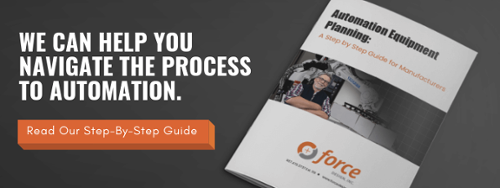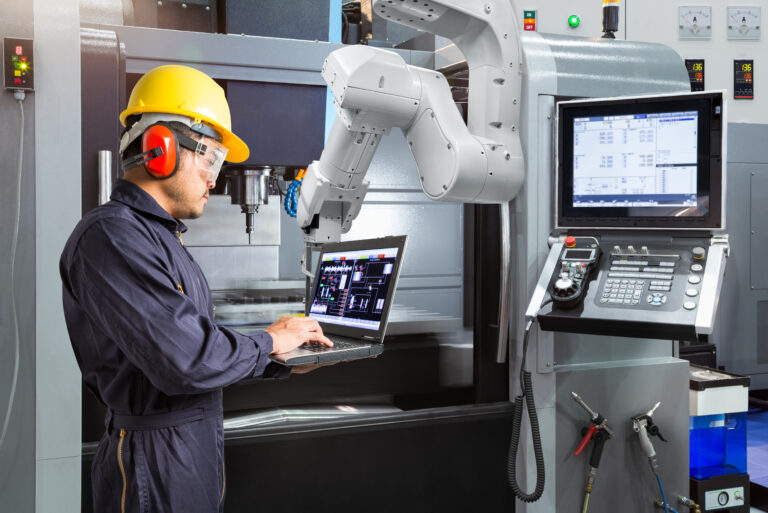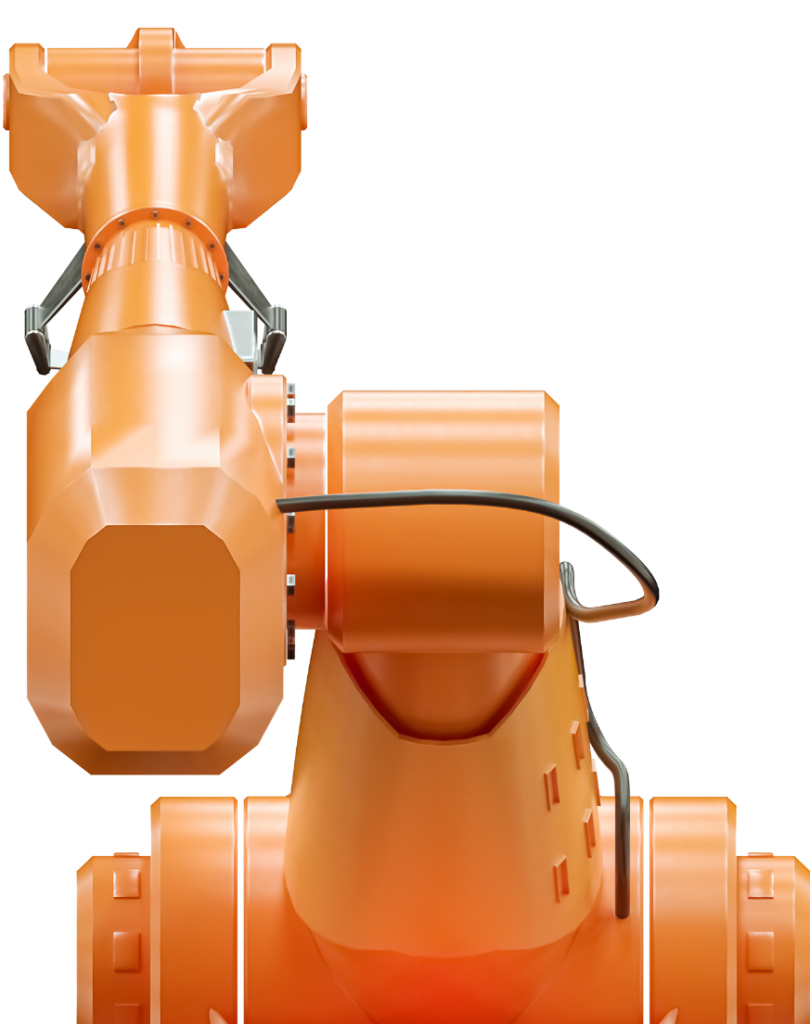Automation integrators go by many names. You may have heard them referred to as system, process, or even robot integrators—but each of these terms refers to the same thing. Automation integrators act as your organization’s partner when it comes to all things automation. Partnership with an integrator means that adopting new technologies, learning to better leverage existing tools, and solving unique and complex problems can all be made easier and more efficient.
Skilled automation integrators work tirelessly to apply cutting-edge thinking and technologies to your brand’s unique position. It’s crucial to seek out an integrator with a steadfast commitment to developing and building the best automation system possible for your operational needs and your budget. An experienced provider will understand that some applications don’t require top notch components while others can’t function appropriately without them. You’ll also want an integrator who offers support for their systems with long-term repair services and is skilled in inter-device communications.
“Even though manufacturing is one of the most highly automated industries globally, there is still significant automation potential within the four walls of manufacturing sites, as well as in related functional areas such as supply chain and procurement,” according to research by McKinsey. In fact, their research found that, globally, 64 percent of working hours spent on manufacturing-related activities are automatable.”
Advances in technology transform manual processes in new ways all the time. For manufacturers, this can save time and money, boost production and quality, and even create new opportunities for workers. But most small and medium-size manufacturers need help from an integrator to make this happen. Finding the right one for your situation is complex. More than just a supplier of fancy equipment, an integrator should be a partner who understands your goals and has the expertise to help you succeed.
“More than just a supplier of fancy equipment, an integrator should be a partner who understands your goals and has the expertise to help you succeed.” Tweet this.
What to Look for in a Good Automation Integrator
It’s important to find a well-rounded system integrator. Using a versatile provider will ensure that they will be prepared for any challenges faced by your unique operation. When sourcing a system integrator, look at the following areas.
Examine Their Work
It’s important to look at how many years of experience a company has, but consider the types of projects they do as well. If they have a specialty, and if that specialty matches your goals, they probably have the expertise you need. If they specialize in a single type or aspect of automation (e.g. vision applications) that you don’t require, however, they may not have broad enough knowledge for your specific situation. While a generalist integrator may have some experience in several types of automation, they might not have enough detailed experience for complex or highly specialized processes.
Knowing what brand or vendor the integrator uses for components is also helpful. If you are familiar with certain equipment, you might like to know if the integrator has worked with it before. Note also if they are “vendor agnostic” and purchase from a variety of sources, or if they work with a single vendor exclusively. The latter is not always a bad sign, but it could mean some equipment options are limited. For example, if an integrator exclusively uses one brand of robot, they might not be able to meet specific needs that fall outside of that brand’s capabilities.
“The true test to distinguish a good integrator from a bad one … is contacting end users about their experience,” says Engineering 360. Potential integrators should be willing to provide references. Try to find out how the automation system is working and if the project stayed on schedule and on budget. You also want to find out about their experience working with the integrator’s team. Was communication clear and timely? Did both parties establish rapport and have a good working relationship? Were they upfront about any setbacks or if things didn’t go as planned? Was there a backup plan? Asking about ongoing support is also important. Most end users will have to call on their integrator for troubleshooting, adjustments and other assistance, but if it becomes a routine occurrence, it could be a sign that something is wrong.
“Most end users will have to call on their integrator for troubleshooting, adjustments and other assistance, but if it becomes a routine occurrence, it could be a sign that something is wrong.” Tweet this.
Assess Their Approach to Automation and Business
In addition to experience and expertise, look at how each integrator conducts business. Do they take time to fully understand the unique aspects of each project or do they take more of a one-size-fits-all approach? Is there a tendency to try something new or unproven just because it’s new? Do they value creativity and enjoy the challenge of problem solving?
You might not be familiar with all of the automation options that exist, so it’s critical to find an integrator that is. Are they up to date on the latest advances and technologies? Are they willing to try something new or do they seem set on certain ways of doing things? The Association for Advancing Automation says, “a qualified integrator who’s up on advancements in technology may help you look farther into the future to show how automation can help you grow your business over an extended period of time.”
But, try to notice if they’re promising more than they can deliver. Do they have an oversimplified idea of your process? Are there attempts to throw in extras that seem out of their usual scope of work? Does the price or timeline seem too good to be true? Does the integrator acknowledge the risks inherent in any automation project? It’s better to find out the limitations of a supplier now than when the project is half finished and faltering.
Finally, look at them from a business perspective. Things to consider include the number of employees, turnover rates, financial stability and even how frequently they subcontract specialized work. Furthermore, do their company values align with yours in terms of reasons to add (or not add) automation, roles and responsibilities, and communication styles?
An Affinity for Computer Software, Hardware, and Networking
The ideal system integrator won’t have any problem getting up close with the finer details of the existing software, hardware, and networking functions. Look for a qualified staff with a strong collective background in computer science or engineering.
Experience in other technical disciplines may be helpful, as well. A versatile skillset and background demonstrate that integrators have built the critical skills for successful system integration. Problem-solving and the capability to understand complex, volatile situations are essential in any system integration project.
Proof of Analytical and Hands-On Problem-Solving Capabilities
Working as a system integrator is a hands-on job. As such, an integrator will need to have the skills and knowledge necessary to tackle a wide variety of difficult interoperability issues. Many businesses that move towards automation run into trouble with application components that are developed by different teams, at different times, or come from different providers. A skilled integrator will be prepared for software and hardware conflicts resulting from these issues.
Your system integrator will also need to understand how to analyze application and network logs. They should know about various means of communication methodologies that could be employed to encourage systems to communicate—a handful of these include LON, BACnet, Modbus, and Legacy. Fluency in numerous disciplines should also be a requirement. Look for somebody with a deep understanding of the following:
- Control systems
- Electrical systems
- Mechanical systems
- IT/IS
- Software applications and data management
- Network/IT/application security and visualization
See whether or not they can apply their knowledge and prior experience to come up with solutions. Probe their ability to conceptualize unique solutions for your specific application.
Look for opportunities to test an integrator’s skill when it comes to design and engineering. The ideal automation integrator should be able to generate robust 3D CAD designs for the purposes of communicating concept and function to the customer and for accuracy in manufacturing and assembly. They should also be able to clearly display solid implementation and integration skills and utilize the latest .NET capabilities.
Assess Their Understanding of Best Practices in a Broad Range of Industries
Automation integrators should offer organizations a honed skillset pulled from experience with a broad range of applications ranging from food and beverage to automotive and more. Palletizing, roll handling, flat product handling, assembly, case packing, loading, and unloading are all capabilities that may be automated—and an experienced system integrator can handle all of these processes.
An expert integration team has the capability to create the necessary software and hardware for any automation project. This includes the ability to design and manufacture customized systems for processes such as:
- Adhesive application
- Cutting
- Laser solutions
- Material removal
- Metrology
- Non-destruction inspection
- Welding
Check Their Fit as a Long-Term Partner
Good working relationships require clear communication. Because no two manufacturing automation projects are exactly alike, you must explain your processes and plans in great detail, and they should be listening closely. Do they ask clarifying questions? Are they willing to discuss options with you? Will they respond to your inquiries quickly enough to keep the project moving? “A good integrator … will not dismiss or ignore customers’ questions, and admits when they do not have an immediate answer but are willing to figure it out,” says Engineering 360.
Find out if the integrator has clear expectations about the roles and responsibilities for all parties involved, including any subcontractors. Look for signs that the integrator is organized and manages workflow effectively.
Especially if you are new to automation, look for a supplier that provides ongoing support. This includes testing and refining the system, training and troubleshooting. Do they seem invested in your long-term success? The Association for Advancing Automation says: “Setting up a successful automation system is more than just buying the latest robot with the slickest bells and whistles. Integrators can prep companies on the small details that get the most out of a system.” For example, integrators may suggest tooling or consumables that further improve output, or they might customize training to match employees’ needs.
So much of your automation project’s success depends on the integrator you choose. Taking time to conduct thorough research on each integrator you’re considering includes reviewing their experience, talking to past customers, observing systems they’ve installed, and paying attention to their communication and business style. It’s well worth the effort in the end.
If you need help getting up to speed on automation topics and the latest technology for your project, contact us with questions.




